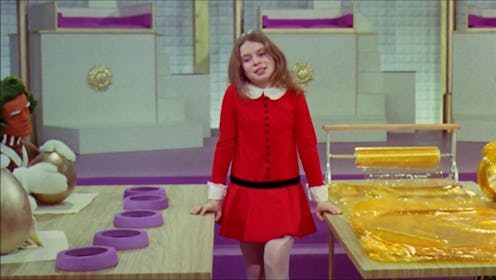Life
Why People Who Broke The Rules A Lot As Kids Make More Money As Adults, According To A Study

I spent most of my childhood at the principal's office for committing a number of low-level offenses (one time I recorded my teacher screaming at a student and played it back for her in front of the class. No one was happy). My parents considered this insolence a bad thing, but apparently it was just a precursor to my future as a very rich person, which I expect will happen any day now! Such is the conclusion of one study, which found that defiant sixth graders grew up to make the most money. Take THAT, Principal Roz!
The study, published in Developmental Psychology in 2015 and revisited this week in Psychology Today, started documenting the in-school behavior of 745 sixth graders in the year 1968, then revisited them 40 years later, in 2008, to see how they'd fared. The study factored in the students' intelligence, socioeconomic status, behaviors, and general characteristics ("inattentiveness, school entitlement, responsible student, sense of inferiority, impatience, pessimism, rule breaking and defiance of parental authority, and teacher-rated studiousness," per the study's abstract).
When the study's authors revisited the sixth graders four decades later, they found, unsurprisingly, that the most studious students were more likely to have embarked upon appropriately reputable career paths. But what was interesting was that the so-called "rule breakers" of the group were making the most money, even more than the students with good jobs and work ethics.
Though that may seem counterintuitive, if you think about it, it does make a lot of sense. As the study's authors noted, people who break rules seem less concerned about what people think of them, which makes it more likely for them to confront their bosses about raises or pursue otherwise more lucrative endeavors. The authors also think people with less agreeable behavior may value competition above cooperation — instead of working well with others, they want to do better than others, pushing themselves in more high-powered career paths and gunning for better wages.
This isn't the first study to suggest people who don't conform to typical social norms tend to get ahead. A study conducted in 2012 and referenced by the Developmental Psychology study's authors found that agreeable people tended to make less money than folks who were more comfortable with confrontation — although women were more likely to be rewarded for being agreeable than men. That jibes with recent research that found high-achieving women were less likely to be called back for job interviews than high achieving men and mid level-achieving women, in part because employers prefer women employees who are more likable, and less highly-qualified women are reportedly perceived that way.
The 2012 study reiterates this, reporting in its abstract: "Because agreeable men disconfirm (and disagreeable men confirm) conventional gender roles, agreeableness was expected to be more negatively related to income for men (i.e., the pay gap between agreeable men and agreeable women would be smaller than the gap between disagreeable men and disagreeable women)." Basically, everything is lose-lose.
I have my own theories about why children who act out tend to be more financially successful, and it has less to do with bad behavior and more to do with creativity and bucking social norms. As previously mentioned, I was a bit of an academic hellion in my youth, and a lot of it was because I was bored. Interrupting a lesson with jokes, or reading under my desk, or changing my teacher's password so she couldn't access her desktop account was, obviously, not the most responsible way to get through the school day, but it kept me from dozing off during particularly tedious classes, and I sense that's the case for a lot of misbehaving students. I wouldn't be surprised if some of those kids harnessed that creativity to find more lucrative ways to make money, hence their wealth in adulthood.
Then again, I frequently cry when I pay my credit card bill, so.